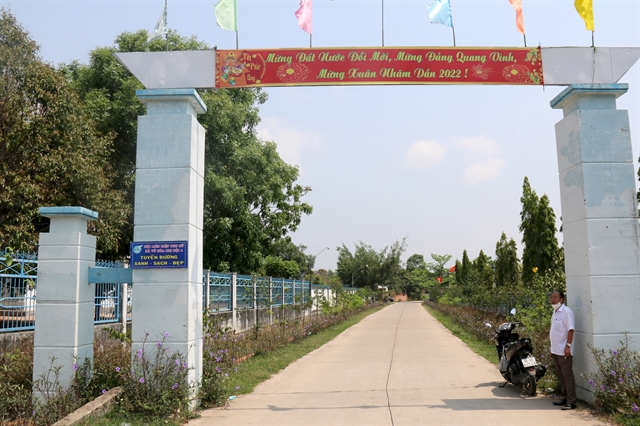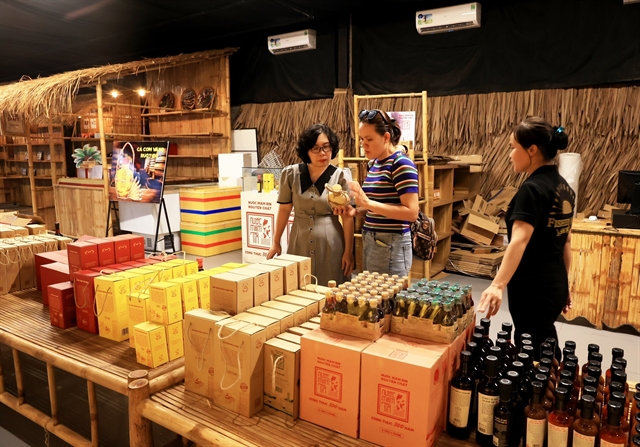Bình Thuận Province boosts development of new-style rural areas
Society – Economy - Ngày đăng : 10:24, 23/09/2024
 |
| A rural road in Bình Thuận Province’s Đức Linh District is paved and well maintained. – VNA/VNS Photo Nguyễn Thanh |
BÌNH THUẬN – Bình Thuận Province is enhancing the development of new-style rural areas to improve the lives of its rural residents.
The south-central province has had 74 out of its 93 communes recognised as new-style rural communes under the national programme of the same name.
A new-style rural commune must meet the programme’s 19 criteria related to infrastructure, irrigation, electricity, environment, income, education, healthcare, social security, culture, and more.
The province also has six advanced new-style rural communes, which achieve higher standards across the 19 criteria.
Hàm Cường was the first commune in Hàm Thuận Nam District recognised as an advanced new-style rural commune last year.
Its rural roads are well-constructed, clean and beautiful, meeting local needs for transporting agricultural products. Its average income is VNĐ57.6 million (US$2,300) per year, the rate of poor households is only 1.98 per cent and 96 per cent of its population has health insurance cards.
The programme has significantly improved the lives of rural residents and the overall appearance of rural areas in the province.
Nguyễn Thị Hoài Thư, head of the dancing club in Minh Hoà Hamlet, Hàm Thuận Nam District’s Hàm Minh Commune, said the club has 20 members aged between 40 and 60.
“The members gather every night for dancing activities to entertain themselves and stay healthy.”
Hàm Minh, recognised as a new-style rural commune, has established many sports and arts performance clubs catering to people of different ages.
It has invested in cultural houses and facilities for local entertainment, and installed sports facilities in public areas for exercise.
Nguyễn Đình Hà, chairman of the Hàm Minh People’s Committee, said the commune was striving to meet all criteria for an advanced new-style rural commune by October.
Local authorities indicate that the programme has attracted rural residents as they are its direct beneficiaries.
Last year, local people and communities contributed more than VNĐ61 billion ($2.5 million) to implement the programme, while companies contributed over VNĐ38.5 billion ($1.6 million).
The province aims to develop agricultural and rural tourism in conjunction with building new-style rural areas.
In Tánh Linh District, the administration plans to establish one to two rural tourism sites under the programme by 2025.
The district has identified tourism as a key sector for socio-economic development, having welcomed about 63,000 tourists last year, meeting its target.
The province plans to have 75 communes recognised as new-style rural communes and 30 advanced ones next year, along with 10 exemplary new-style rural communes.
An exemplary new-style rural commune must achieve very high standards across all 19 criteria.
Mai Kiều, director of the province Department of Agriculture and Rural Development, said the province’s steering committee for the national programme of building new-style rural areas had implemented various measures, including strengthening advocacy to enhance awareness among state officials and rural residents about the emulation movements for building new-style rural areas.
The province hopes to effectively implement the programme to improve the lives of rural people and address existing issues related to the environment, food safety and clean water, according to Kiều.
It will also restructure agricultural production by improving the yields, quality and value of key agricultural products in each locality, while fostering linkages between stakeholders to develop value chains for the products.
It seeks to attract investment in rural areas and further develop products under the “One Commune – One Product” (OCOP) programme.
OCOP Products
 |
| Tourists visit the Làng Chài Xưa Fish Sauce Museum in Bình Thuận Province’s Phan Thiết City. The museum, the only one of its kind in the country, showcases various delicious sauces, including those recognised under the country’s “One Commune – One Product” programme. – VNA/VNS Photo Hồng Đạt |
Bình Thuận has 128 OCOP products rated between three and four stars, including a range of speciality products from coastal, island and mountainous areas, particularly seafood, fish sauces and dragon fruit-related items, which have significant potential as OCOP products.
The country’s largest dragon fruit producing province has created numerous products from it such as dried fruit, juices, jams, wines, and other beverages.
The OCOP programme has generated jobs, increased rural incomes and boosted product sales.
The province hopes to have 161 OCOP products by the end of this year, prioritising the development of products that utilise local materials and labour and ensuring steady supply of inputs for them.
It provides guidance and assistance to producers to help them meet global good agricultural practices, organic and other quality standards.
It has strengthened inspections of OCOP product quality and supported production establishments, cooperatives, and companies in linking with modern distributors, including supermarkets, convenience stores and e-commerce platforms for selling their products.
The province also aims to develop rural tourism alongside the OCOP programme by organising festivals to introduce and promote OCOP products at events, fairs, trade promotion activities, and popular tourist destinations nationwide. – VNS
